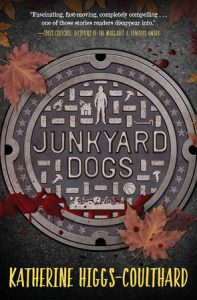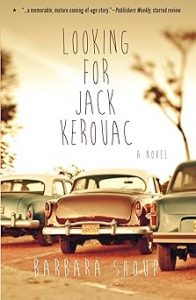Writing Boys by Barbara Shoup and Kat Higgs-Coulthard
Indiana authorsWriting Boys by Barbara Shoup and Kat Higgs-Coulthard and Kat Higgs-Coulthard are longtime friends who met through their involvement in The Indiana Writers’ Center. Each has been honored by the 2012 Eugene and Marilyn Glick Foundation, with Shoup receiving the 2012 Regional Indiana Author Award and Higgs-Coulthard honored on the short-list for the 2024 Indiana Author Award. Barb and Kat popped in to discuss writing from the male perspective.
Kat: During one of my writing workshops, someone asked me if I found it hard to write the main character of Junkyard Dogs, given that Josh is a cisgender male and I am cisgender female. The question took me by surprise because I hadn’t really sat down to write from the male perspective. I sat down to write a story and it was Josh’s story. Most of my stories start with a character whose voice is so strong that I must write their story. I don’t get a lot of say over who that character is; they appear on the stage nearly fully formed.
Barb: Same here! Three of my five YA novels are told in first person, from the point of a teenage boy. There was no way the stories I wanted to tell could have been told any other way and, it seemed, the boys knew this, too. Their voices were there from the start.
Sometimes people ask, how can you write from a teenage boy’s point of view—and why? My answer is: it’s our job as fiction writers to create characters unlike ourselves. In fact, I’ve found characters closest to myself the most difficult to write because I think I know everything about them, limiting the possibility of surprise.
Writing characters unlike myself–teenage boys, for example–I’m dependent on observation. A character appears in my mind’s eye and I look at him just as I look at real people, trying to figure out who they are. His stance, his stuff, the setting. What he’s wearing, what he’s doing, what or who he seems to be paying attention to.
Then I set him moving into the story we create together.
Kat: This really connects to why I write in the first place. I write because I want to know more about something. Usually that something is an aspect of human behavior. My writing often explores family dynamics, especially when the people who are supposed to protect you can’t or won’t.
Writing from the male perspective also gives me some distance from the story. When I first started writing, I wrote a memoir about a difficult time in my family history. Using myself as the viewpoint character helped me understand the events and the timeline of what happened a bit more deeply. But telling that story from my own point of view made it hard to think critically about the perspectives of others.
I wrote Junkyard Dogs from the perspective of someone who I had very little in common with–a teenage boy. It became an opportunity for me to explore the same themes, but from outside my own head. To think about the choices someone completely different from me would make if put in situations where his family became the source of his trauma. Doing that allowed me to explore the same theme at a much deeper level because my own thoughts and actions weren’t overlaid on top of what the character was going through.
Barb: Exploring my own stuff “sideways” is what I do, too–but I don’t usually do it consciously. What I’m doing hits me on the side of the head someplace in the process. For example, Looking for Jack Kerouac started out to be a story about a kid taking off to look for Jack Kerouac after the death of his mother. It was only toward the end that I realized I was writing “sideways” about my sister’s death and its effects on her two sons. What Kerouac told Paul, the main character, about loss was what I needed to hear myself.
Kat: Funny how our traumas sneak onto the page even when we think we’re writing about something completely unrelated. You mentioned that you do a lot of observation when you’re writing from a male perspective. What does that process look like for you?
Barb: I’ve lived with my young-at-heart husband a long, long time, observing how he navigates in the world with curiosity and delight. I’ve watched four nephews and a grandson grow from boys to men. I’ve taught scores of teenage boys who shared their lives and hearts in their writing.
There’s a bit of all of them in my fictional characters, though each character is a person in his own right.
Boys often use different words than girls do; generally, they’re not chatters. They move through space differently. How they spend their spare time is different. Of course, there’s a huge range of how boys are! Nonetheless, writers can “build” a believable character by keeping these things in mind.
Kat: Definitely. People watching is vital to getting all those details right. I think it’s also important to realize that gender is a continuum. The traits that we have assigned to boys or girls are just that–assignations. So it shouldn’t surprise us that we have a lot in common among and between the genders. Take vocabulary. It can be heavily influenced by personality and interests. Whether a character is into art or science, sports or literature, that determines the vocabulary they will have absorbed and that will come out in their voice.
Barb: Absolutely! Bottom line: every single person in the universe is unique. Writing fiction that matters depends on the writer discovering what makes each character who they are, including their individual gender traits, and translating their uniqueness to scenes with details and dialogue that give the reader the pleasure of making that discovery, too.
—
Kat Higgs-Coulthard is a middle grade and young adult author whose work has been praised by Publisher’s weekly and Kirkus as “emotionally-nuanced” and “viseral.” She is an Associate Professor of Education at Saint Mary’s College, Notre Dame, where she prepares preservice teachers in literacy and writing instruction. A member of the Society of Children’s Book Writers and Illustrators, the National Writing Project, and the National Council of Teachers of English, Kat is frequently invited to speak at state and national conferences.
Barbara Shoup is a reader, writer, and traveler. She is the author of five award-winning novels for young people, including Wish You Were Here, Stranded in Harmony, and Looking for Jack Kerouac. She lives in Indianapolis, where she serves as the Writer in Residence at the Indiana Writers Center, teaching writers of all ages and abilities and coordinating a summer program for at-risk youth. Her YA novel About Grace is forthcoming from Querencia Press in 2025.
Junkyard Dogs by Katherine Higgs-Coulthard
 A suspenseful and gut-wrenching story of an unhoused teenager struggling to survive a criminal scrapping ring while unraveling a dark family history.
A suspenseful and gut-wrenching story of an unhoused teenager struggling to survive a criminal scrapping ring while unraveling a dark family history.
Josh’s father has gone missing without a trace, and Gran’s ready to call social services. If Josh wants to keep himself and his little brother, Twig, out of the system, he’ll have to take to the streets and track down his dad. But when Josh digs too deep, his dad’s old accomplices catch up to Josh and plunge him into a dangerous underground where putting his trust in the wrong person could number Josh in a growing pile of bodies. This chilling portrayal of a teen desperate for food, shelter, and safety barrels the reader through an emotionally-charged journey as Josh discovers that blood doesn’t always make family—and some bonds can be broken forever.
“Higgs-Coulthard delivers a gritty, emotionally nuanced read about an unhoused teen searching for his absent father. . . . Utilizing atmospherically tense prose and layered, moving characterizations, this melancholy novel showcases one teen struggling to cultivate a better life for himself while navigating financial precarity and personal betrayal.”—Publishers Weekly
Link to order Junkyard Dogs:https://www.peachtreebooks.com/book/junkyard-dogs/
Link for audio version of Junkyard Dogs: https://www.penguinrandomhouse.com/books/727396/junkyard-dogs-by-katherine-higgs-coulthard/
Looking for Jack Kerouac by Barbara Shoup
 In this strong work of historical fiction set in the 1960s, Paul feels understood for the first time after finding a copy of On the Road during a high school trip to New York City: “Like the book knew who I was, knew what I wanted, and was speaking back to me somehow.” Paul’s mother’s unexpected death upsets his determination to break from his girlfriend’s dreams of marriage, until Duke, a fellow Kerouac devotee, entices him on a road trip to Florida to find their hero. Shoup (Wish You Were Here) creates full-fleshed characters filled with yearning, both those Paul leaves behind and those he meets on his journey. Changes in music, politics, race relations, and attitudes toward Vietnam illuminate the volatile era, rendering Paul’s sense of loss and longing both symptomatic of his era and timeless: “Would it ever stop, I wondered—this constant plummeting backward to that lost time, the happiness, the small comforts and promises I used to take for granted?” A relatable protagonist managing a delicate balance between uncomfortable realities and fertile possibilities makes for a memorable, mature coming-of-age story. Publishers Weekly Starred Review
In this strong work of historical fiction set in the 1960s, Paul feels understood for the first time after finding a copy of On the Road during a high school trip to New York City: “Like the book knew who I was, knew what I wanted, and was speaking back to me somehow.” Paul’s mother’s unexpected death upsets his determination to break from his girlfriend’s dreams of marriage, until Duke, a fellow Kerouac devotee, entices him on a road trip to Florida to find their hero. Shoup (Wish You Were Here) creates full-fleshed characters filled with yearning, both those Paul leaves behind and those he meets on his journey. Changes in music, politics, race relations, and attitudes toward Vietnam illuminate the volatile era, rendering Paul’s sense of loss and longing both symptomatic of his era and timeless: “Would it ever stop, I wondered—this constant plummeting backward to that lost time, the happiness, the small comforts and promises I used to take for granted?” A relatable protagonist managing a delicate balance between uncomfortable realities and fertile possibilities makes for a memorable, mature coming-of-age story. Publishers Weekly Starred Review
Link to purchase Looking for Jack Kerouac:
https://www.amazon.com/Looking-Jack-Kerouac-Barbara-Shoup/dp/1938126475/
Category: How To and Tips























